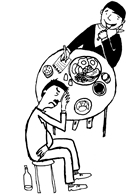Etiquette is a bit of a dirty word these
days. It carries with it associations of prissy types who
worry endlessly about which knife to use and whether you’re
allowed to dip your biscuit in your tea. In more formal times
the demands of etiquette were ghastly and restricting. Brown
shoes should never be worn with a dark suit, peas should only
be picked up with a fork, if you met a Duchess you had to
wait to be introduced to her, etcetera etcetera. In the modern
world, where pretty much anything goes, why worry? As long
as you’re reasonably civilised to your fellow human
that’s all that matters.
This is all very well in a local context.
But once you step outside your own culture, how you behave
does start to matter. Stick your thumb up to a fellow motorist
in a traffic jam in Sardinia and you may be in for a reaction
you didn’t expect. In that country the gesture means,
literally, ‘Sit on this!’. As it does in downtown
Tehran, where it’s called the bilakh and is
as rude as ‘the finger’ in other societies.
| |
 |
| |
Even
the most powerful man in the world has to fit in with
local customs |
Disastrous intercultural misunderstandings
are not restricted to gestures. The American businessman who
arrives at a meeting in Saudi Arabia wearing a tie covered
in jokey pink pigs may well find that he’s lost his
contract – the pig is unclean in Muslim countries, and
wearing such a tie would be seen as an insult. To take another
example. In China, the Arab world and Italy, queuing is not
a priority. But in the Russia, Sweden or the UK, not queuing
is close to immorality – and that Chinese gentleman
who tries to jump to the front is risking serious censure.
This book started out as a relatively
light-hearted investigation into similar intriguing cultural
differences. But as I continued with my research I got more
and more fascinated. Not just with the different behaviours
themselves, but the light they throw on our own ways of doing
things. Here at home, for example, people would regard having
a handkerchief in your pocket as an indisputably polite thing
to do. But in Japan they regard carrying a cloth containing
what they call hanakuso (‘nose shit’)
around in your pocket as disgusting. The polite thing there
is either a) use a tissue which you immediately dispose of,
or b) to snort your snot back inside your body.
The deeper I went the more intriguing
it all became. It’s not just states and societies that
vary around the world, but the way individuals react to them.
In Germany, for example, the State is highly respected by
the populace. There are strict rules about what you can and
cannot do, from jaywalking to using garden machinery on a
Sunday, and by and large people adhere to them. In Brazil,
by contrast, getting round the requirements of the State seems
to be people’s primary motivation. They even have a
word for it – jeitinho, ‘the little way
round or through’.
Living in a country surrounded by people
who by and large behave in the same way one is inclined to
think of what we do as ‘normal’. But a glance
at the wider world shows this not to be the case. Take gay
rights for example. Here, it’s now a given that gay
men and women should be allowed to lead their lives free from
prejudice and restriction. The only remaining areas of contention
might be over civil partnerships and whether or not gay couples
should be allowed to adopt children. But looked at in a world
context, this is a radically liberal position. In the majority
of countries in the world homosexuality is illegal. There
are many states where arrest and imprisonment for this ‘crime’
is routine; and in Saudi Arabia, Iran and various other places
where sharia law prevails homosexual acts attract
the death penalty.
| |
 |
| |
|
| |
 |
| |
|
I started out with the idea of a light-hearted miscellany;
and that’s, by and large, what I’ve ended up with.
Both the wide range of material I wanted to cover and the
format doesn’t lend itself to anything deeper. But I
hope the book is informed with my serious fascination for
the extraordinarily different ways we human beings behave.
In my own travels I’ve on occasion experienced the
humiliation of the unintended faux pas. Messing up
‘the African handshake’ in Cape Town. Thinking
I’d offended an Aboriginal farm manager who wouldn’t
meet my eye in Australia. Assuming - crassly - there would
be alcohol at lunch with the teetotal King of the Zulus. All
these misunderstandings were in theory absurdly trivial. But
in practice caused me embarrassment I still wince about.
Will Going Dutch help you to avoid similar heffalump
traps? I seriously doubt it. But you might have fun reading
about what they could be. And just think, if only somebody
had told me that people never walk on the beach in Rio when
it rains I’d never have got mugged …
For any feedback you may have on either the book or interesting manners and customs around the world please link to the Going Dutch In Beijing blog at:
goingdutchinbeijing.blogspot.com |

